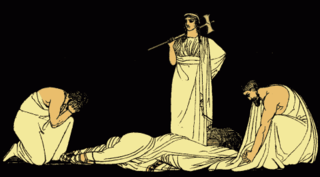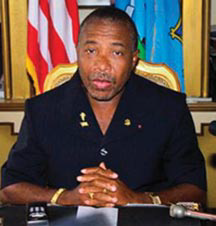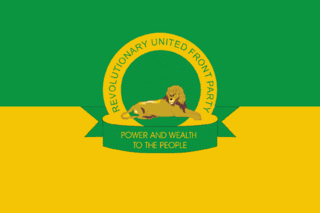Trial and conviction
Fofana was indicted by the Special Court for Sierra Leone on charges of crimes against humanity and war crimes. His trial began on 3 June 2004 and was tried alongside his fellow ranking members of the CDF, Kondewa and Norman. According to his indictment, Fofana was the second in command with the CDF to Norman and principally in charge of logistic of the war as the Director of War.

The Special Court for Sierra Leone, or the "Special Court" (SCSL), also called the Sierra Leone Tribunal, was a judicial body set up by the government of Sierra Leone and the United Nations to "prosecute persons who bear the greatest responsibility for serious violations of international humanitarian law and Sierra Leonean law" committed in Sierra Leone after 30 November 1996 and during the Sierra Leone Civil War. The court's working language was English. The court listed offices in Freetown, The Hague, and New York City.

Crimes against humanity are certain acts that are deliberately committed as part of a widespread or systematic attack directed against any civilian or an identifiable part of a civilian population. The first prosecution for crimes against humanity took place at the Nuremberg trials. Crimes against humanity have since been prosecuted by other international courts as well as in domestic prosecutions. The law of crimes against humanity has primarily developed through the evolution of customary international law. Crimes against humanity are not codified in an international convention, although there is currently an international effort to establish such a treaty, led by the Crimes Against Humanity Initiative.

A war crime is an act that constitutes a serious violation of the laws of war that gives rise to individual criminal responsibility. Examples of war crimes include intentionally killing civilians or prisoners, torturing, destroying civilian property, taking hostages, performing a perfidy, raping, using child soldiers, pillaging, declaring that no quarter will be given, and seriously violating the principles of distinction and proportionality, and military necessity.
On 2 August 2007 Kondewa and Fofana were convicted of the war crimes of murder, violence to life and mental suffering, pillage, and collective punishments. Fofana was acquitted of related charges of crimes against humanity and the war crime of terrorism. [2] On 9 October 2007, the Court sentenced Fofana to six years imprisonment. [3] Fofana has appealed his conviction to the Court's Appeals Chamber.

Murder is the unlawful killing of another human without justification or valid excuse, especially the unlawful killing of another human with malice aforethought. This state of mind may, depending upon the jurisdiction, distinguish murder from other forms of unlawful homicide, such as manslaughter. Manslaughter is a killing committed in the absence of malice, brought about by reasonable provocation, or diminished capacity. Involuntary manslaughter, where it is recognized, is a killing that lacks all but the most attenuated guilty intent, recklessness.

Collective punishment is a form of retaliation whereby a suspected perpetrator's family members, friends, acquaintances, sect, neighbors or entire ethnic group is targeted. The punished group may often have no direct association with the other individuals or groups, or direct control over their actions. In times of war and armed conflict, collective punishment has resulted in atrocities, and is a violation of the laws of war and the Geneva Conventions. Historically, occupying powers have used collective punishment to retaliate against and deter attacks on their forces by Resistance movements.

Terrorism is, in the broadest sense, the use of intentionally indiscriminate violence as a means to create terror among masses of people; or fear to achieve a religious or political aim. It is used in this regard primarily to refer to violence during peacetime or in context of war against non-combatants. The terms "terrorist" and "terrorism" originated during the French Revolution of the late 18th century but gained mainstream popularity in the 1970s in news reports and books covering the conflicts in Northern Ireland, the Basque Country and Palestine. The increased use of suicide attacks from the 1980s onwards was typified by the September 11 attacks in New York City and Washington, D.C. in 2001.

Charles McArthur Ghankay Taylor is a Liberian war criminal and former politician who served as the 22nd President of Liberia from 2 August 1997 until his resignation on 11 August 2003.

Foday Saybana Sankoh was the founder of the Sierra Leone rebel group Revolutionary United Front (RUF), which was supported by Charles Taylor-led NPFL in the 11-year-long Sierra Leone Civil War. Starting in 1991 and ending in 2002. An estimated 50,000 people were killed during the war, and over 500,000 people were displaced in neighbouring countries.

Revolutionary United Front (RUF) was a rebel army that fought a failed eleven-year war in Sierra Leone, starting in 1991 and ending in 2002. It later developed into a political party, which still exists today. The three most senior surviving leaders, Issa Sesay, Morris Kallon and Augustine Gbao, were convicted in February 2009 of war crimes and crimes against humanity.

Samuel Hinga Norman was a Sierra Leonean politician from the Mende tribe. He was the founder and leader of the Civil Defence Forces, commonly known as the Kamajors. The Kamajors supported the government of Ahmed Tejan Kabbah against the Revolutionary United Front(RUF), which was led by Foday Sankoh. On 7 March 2003 Hinga Norman was indicted by the Special Court for Sierra Leone for war crimes and crimes against humanity. He died on 22 February 2007 in Dakar, Senegal while undergoing medical treatment.
Thomas Lubanga Dyilo is a convicted war criminal from the Democratic Republic of the Congo (DRC) and the first person ever convicted by the International Criminal Court (ICC). He founded and led the Union of Congolese Patriots (UPC) and was a key player in the Ituri conflict (1999–2007). Rebels under his command have been accused of massive human rights violations, including ethnic massacres, murder, torture, rape, mutilation, and forcibly conscripting child soldiers.
Allieu Kondewa is a former traditional doctor in the Kamajors tribe and military commander of the Civil Defence Forces in Sierra Leone. He was born in the Bo District and lived served until his arrest and subsequent trial by the Special Court for Sierra Leone.
Issa Hassan Sesay served as senior military officer and commander in the Revolutionary United Front and AFRC/RUF forces in their insurrection against the government of Sierra Leone. He was said to be subordinate only to Sam Bockarie, the Battlefield Commander, and Johnny Paul Koroma, leader of the AFRC.

The Extraordinary Chambers in the Courts of Cambodia, commonly known as the Cambodia Tribunal or Khmer Rouge Tribunal (សាលាក្ដីខ្មែរក្រហម), is a court established to try the most senior responsible members of the Khmer Rouge for alleged violations of international law and serious crimes perpetrated during the Cambodian genocide. Although it is a national court, it was established as part of an agreement between the Royal Government of Cambodia and the United Nations, and its members include both local and foreign judges. It is considered a hybrid court, as the ECCC was created by the government in conjunction with the UN, but remains independent of them, with trials held in Cambodia using Cambodian and international staff. The Cambodian court invites international participation in order to apply international standards.
Germain Katanga, also known as Simba, is a former leader of the Patriotic Resistance Force in Ituri (FRPI), an armed group in the Ituri Province of the Democratic Republic of the Congo (DRC). On 17 October 2007, the Congolese authorities surrendered him to the International Criminal Court (ICC) to stand trial on six counts of war crimes and three counts of crimes against humanity. The charges include murder, sexual slavery, rape, destruction of property, pillaging, willfull killing, and directing crimes against civilians, to name a few.
Alex Tamba Brima, also known as Gullit, was a Sierra Leonean military commander. He was one of a group of seventeen soldiers in the Sierra Leone Armed Forces who called themselves Armed Forces Revolutionary Council (AFRC) that successfully staged a coup that ousted president Ahmad Tejan Kabbah in May 1997. On 19 July 2007 he was convicted and sentenced to 50 years in prison for committing war crimes and crimes against humanity during the Sierra Leone Civil War.
Ibrahim ("Brima") Bazzy Kamara was a commander of the soldiers of the Sierra Leonean Armed Forces Revolutionary Council (AFRC) and in 2007 was convicted of committing war crimes and crimes against humanity in the Sierra Leone Civil War.
Santigie Borbor Kanu was a Sierra Leonean military commander in the Armed Forces Revolutionary Council (AFRC). He was one of a group of seventeen soldiers in the military of Sierra Leone who successfully staged a coup that ousted president Ahmad Tejan Kabbah in May 1997. In 2007, Kanu was convicted of committing war crimes and crimes against humanity in the Sierra Leone Civil War.
Augustine Gbao, also spelled as Augustine Bao, is a former paramilitary commander of the Revolutionary United Front (RUF) in the Sierra Leone Civil War. In February 2009, he was convicted of war crimes and crimes against humanity by the Special Court for Sierra Leone and sentenced to 25 years in prison. He was a senior commander in the RUF from 1991 until his capture in 2002.

The International Criminal Court investigation in the Democratic Republic of the Congo or the situation in the Democratic Republic of the Congo is an ongoing investigation by the International Criminal Court (ICC) into crimes committed in the Democratic Republic of the Congo (DRC) during the Second Congo War and its aftermath, including the Ituri and Kivu conflicts. The war started in 1998 and despite a peace agreement between combatants in 2003, conflict continued in the eastern parts of the country for several years. In April 2004 the government of the DRC formally referred the situation in the Congo to the International Criminal Court, and in June 2004, prosecutor Luis Moreno Ocampo, formally opened an investigation. To date, arrest warrants have been issued for:
During the Sierra Leone Civil War gender specific violence was widespread. Rape, sexual slavery and forced marriages were commonplace during the conflict. It has been estimated by Physicians for Human Rights (PHR) that up to 257,000 women were victims of gender related violence during the war. The majority of assaults were carried out by the Revolutionary United Front (RUF). The Armed Forces Revolutionary Council (AFRC), The Civil Defence Forces (CDF), and the Sierra Leone Army (SLA) have also been implicated in sexual violence.
This page is based on this
Wikipedia article Text is available under the
CC BY-SA 4.0 license; additional terms may apply.
Images, videos and audio are available under their respective licenses.












